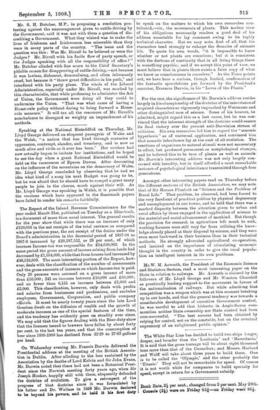The Report of the Inland Revenue Commissioners for the year
ended March 31st, published on Tuesday as a Blue-book, is a document of more than usual interest. The general results for the year show that while there was an increase of only £128,056 in the net receipts of the total revenue as compared with the previous year, the net receipt of the duties under the Board's administration in the decennial period of 1897-98 to 1907-8 increased by £28,287,552, or 28 per cent., of which increase Income-tax was responsible for £14,689,003. In the same period the gross amount of income arising from lands had decreased by £1,884,000, while that from houses had increased by £48,516,000. The most interesting portion of the Report, how- ever, deals with the classification of the number of assessments and the gross amounts of incomes on which Income-tax is paid. Only 20 persons were assessed on a gross income of more than £50,000; 241 on incomes between £10,000 and £50,000; and no fewer than 6,155 on incomes between £1,000 and £2,000. This classification, however, only deals with profits and salaries from businesses and professions, and excludes employees, Government, Corporation, and public company officials. It must be nearly twenty years since the late Lord Goschen dwelt on the diffusion of wealth and the growth of moderate incomes as one of the special features of the time, and the tendency has evidently gone on steadily ever since. We may add that the figures dealing with the Beer-duty show that the licenses issued to brewers have fallen by about forty per cent. in the last ten years, and that the consumption of beer since 1899-1900 has declined from 32.29 to 27'63 gallons per head.






































 Previous page
Previous page